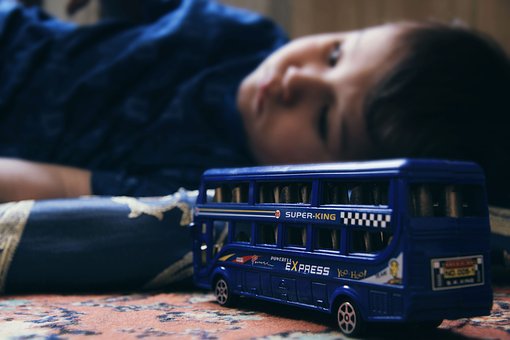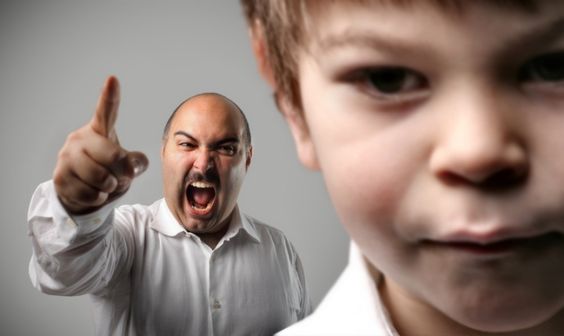Toxic Parents: Ways To Identify Them

Parenting is a hard task and many times we often wonder how we’re doing, rather than stopping to think if everything we do for our children is done for their happiness or if it is for our own. This is when the so-called toxic parents emerge.
Toxic parents are those who believe they’re helping or protecting their children but are actually causing harm without realizing it.
From the moment we become parents, our only concern is their well being. We want to give them all the opportunities that we did not have, many times without them being aware of the difficulty and work involved in providing them with all they need.
Other times, however, we make the mistake of being too serious and strict, this can also be negative. The same happens when we always put our own needs in front of their own or when we want them to do what we want them to do at all costs.
This is why we need to ask ourselves the following question. How can we identify a toxic parent?
Types of toxic parents
The Helicopter
These are parents who overprotect their children taking care of all their tasks and problems. This spans from talking with their teachers to picking out the child’s friends.
This situation ends up causing the children to suffer from anxiety and stress disorders.
It prevents them from developing their own independence and makes them unable to confront certain types of situations.
Competitive Parents
These are toxic parents who project their frustrations and desires on their children.
They are usually authoritarian people, who force their children to get the best grades to excel in every discipline, even though this means incredible hours of work. In the majority of cases they don’t stop to ask their children what they really want.
This type of parent ends up creating very competitive adults that will most likely have stress issues. When they grow up they might also have low self-esteem or a need for acceptance and recognition.
Mushroom parents
At first sight they are the ideal prototype parent from the eyes of a child: Permissive, generous and complacent.
They never place boundaries for their children and allow their children to follow up on each and every one of their random whims. They believe that this makes their children happy, however in reality they are creating children that will grow up to be selfish and unreliable.
These parents are usually people who had very strict education regimes when they were growing up or parents who spend too much time away from home. They try to make up for their lacking presence with gifts and excessive freedom.
The Manipulators
These are parents who want their children to do what they want by using any method possible. They often use emotion blackmail, psychological abuse (in severe cases also physical) and manipulation.
They raise children that suffer from a feeling of inferiority and guilt.
They are people who become victims, capable of lying or twisting conversations for their own benefit. They are characterized fundamentally by their selfishness.

Absent Parents
As the name says, they are almost never present in the lives of their children. Sometimes it may be due to work and others due to conjugal separation.
Children in these cases suffer feelings of abandonment and lack of important emotional support. Many of them experience hate or sometimes admiration towards a parent.
This kind of toxic parent may not consider their children as a priority.
The Buddies
These type of parents try to be the best friends of their children. Just like marshmallow parents, they do not impose limits thinking that they will be loved more. They often use expressions that others would consider “juvenile.” They usually behave inappropriately and are excessively permissive.
This kind of behavior is also maintained in front of their children’s friends as well. This often makes the child feel embarrassed and ashamed.
This attitude prevents them from being taken seriously. They are not seen as authority figures or respected. This in turn creates estrangement between the parents and their children.
“Education is the most powerful weapon you can use to change the world.”—Nelson Mandela
Are there solutions to these parenting styles?

If you felt identified with any of these groups of parents, there is still time to modify your behavior. There is no need for self punishment or feeling guilty. The most important thing is to be aware of the problem. Sometimes we can become toxic parents because we want the best for our children. The problem is that not everything we think is good actually is.
There is only one childhood period and your child needs to spend it with you. No matter how many paternal and maternal figures interact with them, you will always be their reference. You should always be attentive to their needs and try to empathize with them as much as possible. Nobody knows them better than you do.
We should not forget that children are people too, with their own fears, desires and feelings that are just as important as those of adults. They should be respected and valued, as this stage could determine the rest of their lives.
Parenting is a hard task and many times we often wonder how we’re doing, rather than stopping to think if everything we do for our children is done for their happiness or if it is for our own. This is when the so-called toxic parents emerge.
Toxic parents are those who believe they’re helping or protecting their children but are actually causing harm without realizing it.
From the moment we become parents, our only concern is their well being. We want to give them all the opportunities that we did not have, many times without them being aware of the difficulty and work involved in providing them with all they need.
Other times, however, we make the mistake of being too serious and strict, this can also be negative. The same happens when we always put our own needs in front of their own or when we want them to do what we want them to do at all costs.
This is why we need to ask ourselves the following question. How can we identify a toxic parent?
Types of toxic parents
The Helicopter
These are parents who overprotect their children taking care of all their tasks and problems. This spans from talking with their teachers to picking out the child’s friends.
This situation ends up causing the children to suffer from anxiety and stress disorders.
It prevents them from developing their own independence and makes them unable to confront certain types of situations.
Competitive Parents
These are toxic parents who project their frustrations and desires on their children.
They are usually authoritarian people, who force their children to get the best grades to excel in every discipline, even though this means incredible hours of work. In the majority of cases they don’t stop to ask their children what they really want.
This type of parent ends up creating very competitive adults that will most likely have stress issues. When they grow up they might also have low self-esteem or a need for acceptance and recognition.
Mushroom parents
At first sight they are the ideal prototype parent from the eyes of a child: Permissive, generous and complacent.
They never place boundaries for their children and allow their children to follow up on each and every one of their random whims. They believe that this makes their children happy, however in reality they are creating children that will grow up to be selfish and unreliable.
These parents are usually people who had very strict education regimes when they were growing up or parents who spend too much time away from home. They try to make up for their lacking presence with gifts and excessive freedom.
The Manipulators
These are parents who want their children to do what they want by using any method possible. They often use emotion blackmail, psychological abuse (in severe cases also physical) and manipulation.
They raise children that suffer from a feeling of inferiority and guilt.
They are people who become victims, capable of lying or twisting conversations for their own benefit. They are characterized fundamentally by their selfishness.

Absent Parents
As the name says, they are almost never present in the lives of their children. Sometimes it may be due to work and others due to conjugal separation.
Children in these cases suffer feelings of abandonment and lack of important emotional support. Many of them experience hate or sometimes admiration towards a parent.
This kind of toxic parent may not consider their children as a priority.
The Buddies
These type of parents try to be the best friends of their children. Just like marshmallow parents, they do not impose limits thinking that they will be loved more. They often use expressions that others would consider “juvenile.” They usually behave inappropriately and are excessively permissive.
This kind of behavior is also maintained in front of their children’s friends as well. This often makes the child feel embarrassed and ashamed.
This attitude prevents them from being taken seriously. They are not seen as authority figures or respected. This in turn creates estrangement between the parents and their children.
“Education is the most powerful weapon you can use to change the world.”—Nelson Mandela
Are there solutions to these parenting styles?

If you felt identified with any of these groups of parents, there is still time to modify your behavior. There is no need for self punishment or feeling guilty. The most important thing is to be aware of the problem. Sometimes we can become toxic parents because we want the best for our children. The problem is that not everything we think is good actually is.
There is only one childhood period and your child needs to spend it with you. No matter how many paternal and maternal figures interact with them, you will always be their reference. You should always be attentive to their needs and try to empathize with them as much as possible. Nobody knows them better than you do.
We should not forget that children are people too, with their own fears, desires and feelings that are just as important as those of adults. They should be respected and valued, as this stage could determine the rest of their lives.
All cited sources were thoroughly reviewed by our team to ensure their quality, reliability, currency, and validity. The bibliography of this article was considered reliable and of academic or scientific accuracy.
- Rojas-Marcos, L. (2014). La familia: De relaciones tóxicas a relaciones sanas. Grijalbo.
- Forward, S. (2010). Toxic Parents. Random House.
- FRIEDMAN, R. A. (2009). When Parents Are Too Toxic to Tolerate. New York Times. https://www.betterdaysandnights.com/When%20Parents%20Are%20Too%20Toxic%20to%20Tolerate.pdf
- Carballo Márquez, A. (2017). Cerebro, estrés y parentalidad. http://repositori.uic.es/handle/20.500.12328/948
This text is provided for informational purposes only and does not replace consultation with a professional. If in doubt, consult your specialist.








